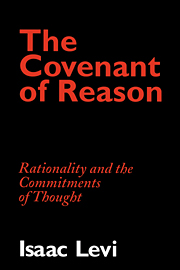Book contents
- Frontmatter
- Contents
- Introduction
- 1 Rationality and commitment
- 2 Rationality, prediction, and autonomous choice
- 3 The logic of full belief
- 4 Consequentialism and sequential choice
- 5 Prediction, deliberation, and correlated equilibrium
- 6 On indeterminate probabilities
- 7 Consensus as shared agreement and outcome of inquiry
- 8 Compromising Bayesianism: A plea for indeterminacy
- 9 Pareto unanimity and consensus
- 10 The paradoxes of Allais and Ellsberg
- 11 Conflict and inquiry
- 12 The ethics of controversy
- Name Index
- Subject Index
8 - Compromising Bayesianism: A plea for indeterminacy
Published online by Cambridge University Press: 05 June 2012
- Frontmatter
- Contents
- Introduction
- 1 Rationality and commitment
- 2 Rationality, prediction, and autonomous choice
- 3 The logic of full belief
- 4 Consequentialism and sequential choice
- 5 Prediction, deliberation, and correlated equilibrium
- 6 On indeterminate probabilities
- 7 Consensus as shared agreement and outcome of inquiry
- 8 Compromising Bayesianism: A plea for indeterminacy
- 9 Pareto unanimity and consensus
- 10 The paradoxes of Allais and Ellsberg
- 11 Conflict and inquiry
- 12 The ethics of controversy
- Name Index
- Subject Index
Summary
Jack Good reports in one of his papers that in 1947 he had a nonmonetary bet with M. S. Bartlett that the predominant philosophy of statistics one century later would be Bayesian. By 1979, Good modified his forecast. He then suggested that the predominant philosophy of statistics would be a Bayes-non-Bayes synthesis or compromise (Good, 1979). Presumably the basis both for the original forecast and its updated revision had less to do with extrapolations from trends then discernible in the thinking of his colleagues than with his optimistic assessment that Good thinking is the wave of the future together with his privileged relation to the source of this inspiration.
Good's predictions appear to be borne out to a considerable degree. Bayesianism has not silenced its critics among statisticians or philosophers who think about probability, induction and statistics. Still the contrast between the status of Bayesian ideas in the 1940s and now is astounding. More interesting yet, however, is the fact that even as the friends of Bayesianism multiply, there is also growing sympathy for ideas that are reminiscent of what Jack seems to have in mind by a Bayes-non- Bayes compromise.
Perhaps the major impetus for Good's quest for Bayes-non-Bayes compromises derives from the extremely demanding character of Bayesian ideals of rational belief, valuation and choice when it comes to applications. We cannot be expected to represent our probability assignments to hypotheses by precisely specified real numbers. The same applies to our utility judgments.
- Type
- Chapter
- Information
- The Covenant of ReasonRationality and the Commitments of Thought, pp. 154 - 172Publisher: Cambridge University PressPrint publication year: 1997



